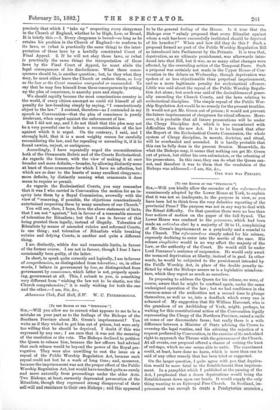[To THE EDITOR OP THE " SPECTATOR."] cm,—Will you allow
me to correct what appears to me to be a mistake on your part as to the feelings of the Bishops of the Southern Province about Mr. Green's imprisonment? You write as.if they wished to get him out of prison, but were only too willing that he should be deprived. I doubt if this was -expressed by any one ; I am sure that it was not the meaning of the resolution or the vote. The Bishops declined to petition the Queen to release him, because the law officers had advised that such release would be beyond the power of the Royal pre- rogative. They were also unwilling to rest the issue on a repeal of the Public Worship Regulation Act, because such repeal could not but be a work of long time; and, moreover, because the imprisonment was not the proper effect of the Public Worship Regulation Act, but would have resulted quite as surely and more naturally from proceedings under the older Acts. Two Bishops, at least, earnestly deprecated persecution of the Ritualists, though they expressed strong disapproval of their self-will and resistance to their own Bishops ; and this appeared
to be the general feeling of the House. Is it true that the Bishops ever " calmly proposed that every Ritualist against whom a snit has been successfully instituted should be deprived of his benefice ?" When and how did they do this P Such a proposal formed no part of the Public Worship Regulation Bill as introduced into Parliament by the Primate. It is true that, deprivation, as an ultimate punishment, was afterwards intro- duced into that Bill, but it-was, as so many other changes were effected, by the overruling action of the Temporal Peers. Such a proposal was certainly not made in the tipper House of Con- vocation in the debate on Wednesday, though deprivation was spoken of as less objectionable than perpetual imprisonment, and as a more legitimate penalty for ecclesiastical offences. Little was said about the repeal of the Public Worship Regula- tion Act alone; but much was said of the desirableness of gener- ally amending the Church Courts, and the laws relating to ecclesiastical discipline. The simple repeal of the Public Wor- ship Regulation Act would be no remedy for the present troubles. It would not get Mr. Green out of prison; it would not prevent the future imprisonment of clergymen for ritual offences. More- over, it is probable that all future prosecutions will be under the Clergy Discipline Act, which is less encumbered with difficulties than the new Act. It is to be hoped that after the Report of the Ecclesiastical Courts Commission, the whole system of Clergy discipline, in morals, doctrine, and ritual, will be overhauled and amended. It is hardly probable that this can be fully done in the present Session. Meanwhile, do what the Bishops may, it seems that nothing can get Mr. Green out of prison, but either his own submission, or the relenting of his prosecutors. In this case, they can do what the Queen can- not, and therefore it was to them that the resolution of the Bishops was addressed.—I am, Sir, &c.,
ONE WHO WAS PRESENT.


































 Previous page
Previous page